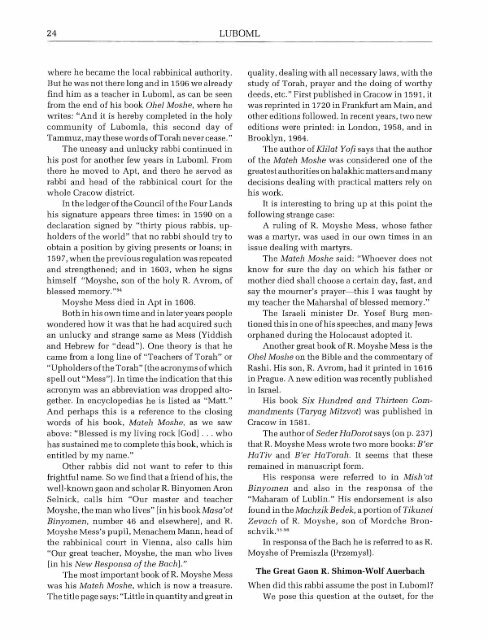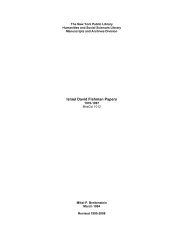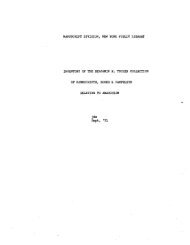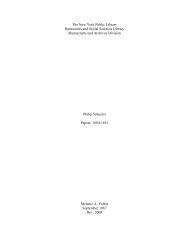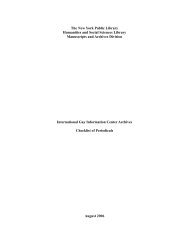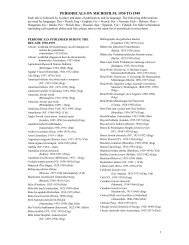pdf available - Multiple Choices
pdf available - Multiple Choices
pdf available - Multiple Choices
Create successful ePaper yourself
Turn your PDF publications into a flip-book with our unique Google optimized e-Paper software.
24 LUBOML<br />
where he became the local rabbinical authority.<br />
But he was not there long and in 1596 we already<br />
find him as a teacher in Luboml, as can be seen<br />
from the end of his book Ohel Moshe, where he<br />
writes: "And it is hereby completed in the holy<br />
community of Lubomla, this second day of<br />
Tammuz, may these words of Torah never cease."<br />
The uneasy and unlucky rabbi continued in<br />
his post for another few years in Luboml. From<br />
there he moved to Apt, and there he served as<br />
rabbi and head of the rabbinical court for the<br />
whole Cracow district.<br />
In the ledger of the Council of the Four Lands<br />
his signature appears three times: in 1590 on a<br />
declaration signed by "thirty pious rabbis, upholders<br />
of the world" that no rabbi should try to<br />
obtain a position by giving presents or loans; in<br />
1597, when the previous regulation was repeated<br />
and strengthened; and in 1603, when he signs<br />
himself "Moyshe, son of the holy R. Avrom, of<br />
blessed memory.""<br />
Moyshe Mess died in Apt in 1606.<br />
Both in his own time and in later years people<br />
wondered how it was that he had acquired such<br />
an unlucky and strange same as Mess (Yiddish<br />
and Hebrew for "dead"). One theory is that he<br />
came from a long line of "Teachers of Torah" or<br />
"Upholders of the Torah" (the acronyms of which<br />
spell out "Mess"). In time the indication that this<br />
acronym was an abbreviation was dropped altogether.<br />
In encyclopedias he is listed as "Matt."<br />
And perhaps this is a reference to the closing<br />
words of his book, Motel' Moshe, as we saw<br />
above: "Blessed is my living rock [God] . . . who<br />
has sustained me to complete this book, which is<br />
entitled by my name."<br />
Other rabbis did not want to refer to this<br />
frightful name. So we find that a friend of his, the<br />
well-known gaon and scholar R. Binyomen Aron<br />
Selnick, calls him "Our master and teacher<br />
Moyshe, the man who lives" [in his book Masa'ot<br />
Binyomen, number 46 and elsewhere], and R.<br />
Moyshe Mess's pupil, Menachem Mann, head of<br />
the rabbinical court in Vienna, also calls him<br />
"Our great teacher, Moyshe, the man who lives<br />
[in his New Responsa of the Bach]."<br />
The most important book of R. Moyshe Mess<br />
was his Mateh Moshe, which is now a treasure.<br />
The title page says: "Little in quantity and great in<br />
quality, dealing with all necessary laws, with the<br />
study of Torah, prayer and the doing of worthy<br />
deeds, etc." First published in Cracow in 1591, it<br />
was reprinted in 1720 in Frankfurt am Main, and<br />
other editions followed. In recent years, two new<br />
editions were printed: in London, 1958, and in<br />
Brooklyn, 1964.<br />
The author of Klilat Yofi says that the author<br />
of the Mateh Moshe was considered one of the<br />
greatest authorities on halakhic matters and many<br />
decisions dealing with practical matters rely on<br />
his work.<br />
It is interesting to bring up at this point the<br />
following strange case:<br />
A ruling of R. Moyshe Mess, whose father<br />
was a martyr, was used in our own times in an<br />
issue dealing with martyrs.<br />
The Mateh Moshe said: "Whoever does not<br />
know for sure the day on which his father or<br />
mother died shall choose a certain day, fast, and<br />
say the mourner's prayerthis I was taught by<br />
my teacher the Maharshal of blessed memory."<br />
The Israeli minister Dr. Yosef Burg mentioned<br />
this in one of his speeches, and many Jews<br />
orphan ed during the Holocaust adopted it.<br />
Another great book of R. Moyshe Mess is the<br />
Ohel Moshe on the Bible and the commentary of<br />
Rashi. His son, R. Avrom, had it printed in 1616<br />
in Prague. A new edition was recently published<br />
in Israel.<br />
His book Six Hundred and Thirteen Commandments<br />
(Taryag Mitzvot) was published in<br />
Cracow in 1581.<br />
The author of Seder HaDorot says (on p. 237)<br />
that R. Moyshe Mess wrote two more books: B'er<br />
HaTiv and B'er HaTorah. It seems that these<br />
remained in manuscript form.<br />
His responsa were referred to in Mish'at<br />
Binyomen and also in the responsa of the<br />
"Maharam of Lublin." His endorsement is also<br />
found in the Machzik Bedek, a portion of Tikunei<br />
Zevach of R. Moyshe, son of Mordche Bronschvik.'<br />
"<br />
In responsa of the Bach he is referred to as R.<br />
Moyshe of Premiszla (Przemysl).<br />
The Great Gaon R Shimon-Wolf Auerbach<br />
When did this rabbi assume the post in Luboml?<br />
We pose this question at the outset, for the


